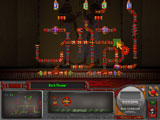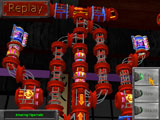Let’s Twist Again: TubeTwist
TubeTwist is great hybrid puzzle-y physics game by 21-6 Productions, best known for their Orbz title, and distributed by GarageGames. The product page describes TubeTwist as follows:
TubeTwist is a puzzle game fashioned after classics like The Incredible Machine and Mouse Trap. Each experiment has many solutions due to the large variety of tubes which can be used to construct each machine. There is no clock and there is no score – so just sit back and enjoy the mind bending fun that is TubeTwist!
It’s Thinking Time
The goal of TubeTwist is deceptively simple. Colored balls start in one tube, and it’s your job as the player to ensure they wind up in a colored end tubes. Each level has a starting layout. In addition to the default pieces, you’re given a limited number of pieces to place wherever you choose. You can use these pieces to bridge gaps in the default layout or to create your own path. I’ve actually solved levels where I don’t even touch the starting layout.
While the goal is obvious enough, the game’s complexity arises through two mechanisms: scarcity and object states.
Piece Scarcity
Some levels are difficult because of the scarcity of the pieces available to the player. You’re given a handful of tubes, at best–certainly not enough pieces to go from point A to point B continuously. These levels force you to rely on the physics of the ball. Inertia can be your friend; if the ball is going fast enough, you don’t need a contiguous pathway. Rather, you could have a few holes and the ball will zip over the gaps without any trouble. Or if you’re feeling especially spicy, you can actually try to launch a ball quite some distance into a tube (the video has an example of this). Accelerator tubes speed the ball up. Careful placement allows you to regulate the ball’s velocity with a fair degree of control, allowing for crafty gap jumps.
Object States
This is where TubeTwist shows its puzzle origins. Many of the tubes have states associated with them. Some tubes toggle their direction after a ball passes through them, while others are physics contraptions in and of themselves. Still other tubes modify the state of the ball–toggling between a gravity-free version and the normal clunky ball.
Depending on how receptive you are to feeling like a complete idiot, you may find the puzzle aspects of TubeTwist frustrating. Typically the levels force you to regulate the order in which things happen. If you need ball A to pass through a tube before ball B gets there, you’ll need to find some way to slow it down. It can get awfully hairy when later levels have upwards of half a dozen switches.
Yet More Complexity
The game also introduces checkpoints in later levels. Rather than simply get the ball from the start to the goal, you need to activate all the checkpoints first. And I did I mention that some levels have half a dozen starting points all spewing balls simultaneously? Later levels really lay on the brain-hurt awfully thick. The game forces you to manage a large number of events in a particular order to pass the stage.
Physics to the Rescue
If TubeTwist were simply a puzzle game, I probably wouldn’t play it. I’m not a big fan of logic puzzles, to be honest (maybe I’m just not very good at them). But because TubeTwist is physics-based, though, I really find myself enjoying it. The physics, coupled with the large number of tubes, means that any one level has a number of solutions available. Some of the solutions are obviously the designer’s intent, while others may be completely new.
Physics do a great job of managing the complexity of what would otherwise be a completely overwhelming puzzle game. It’s a very approachable design. You simply run the machine, note where balls are failing, and make iterative adjustments. Because everything follows the intuitive nature of physics, nothing is ever too confusing.
“PassagePeculiarity” Just Didn’t Have the Same Ring
21-6 Productions managed to use physics to great effect and produced a title that’s challenging yet approachable. I have no idea how well the game is selling, but TubeTwist has already picked up an IGF nomination and finalist status in the ECD Systems Indie Games Showcase. If you happen to be going to E3 this year, swing by booth #6453 in Kentia Hall. As a bonus, I’ll be alongside TubeTwist in the showcase demoing our next Flashbang game.
A free demo of TubeTwist is available from the GarageGames website. The full version costs $19.95.
Related Posts:



 (Rate this game! 65 votes, average: 3.46 out of 5)
(Rate this game! 65 votes, average: 3.46 out of 5)

 My name is Matthew Wegner, and this site is dedicated to physics games.
My name is Matthew Wegner, and this site is dedicated to physics games.